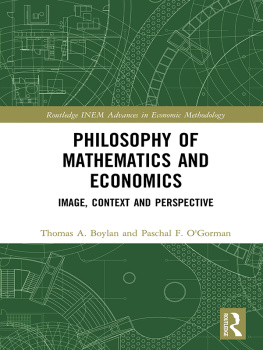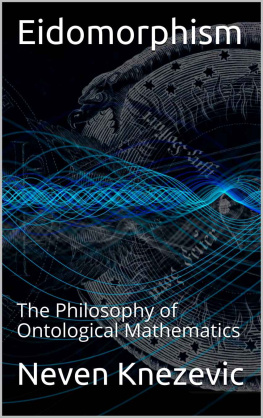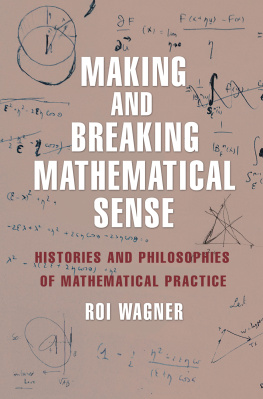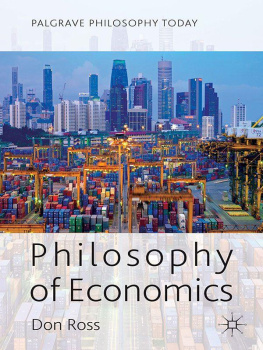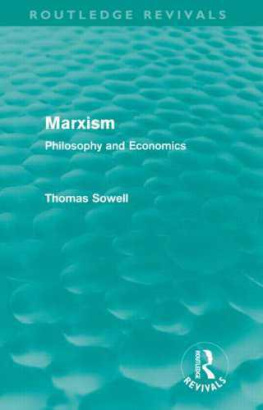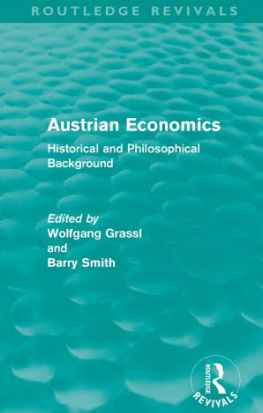Philosophy of Mathematics and Economics
With the failure of economics to predict the recent economic crisis, the image of economics as a rigorous mathematical science has been subjected to increasing interrogation. One explanation for this failure is that the subject took a wrong turn in its historical trajectory, becoming too mathematical. Using the philosophy of mathematics, this unique book re-examines this trajectory.
Philosophy of Mathematics and Economics re-analyses the divergent rationales for mathematical economics by some of its principal architects. Yet, it is not limited to simply enhancing our understanding of how economics became an applied mathematical science. The authors also critically evaluate developments in the philosophy of mathematics to expose the inadequacy of aspects of mainstream mathematical economics, as well as exploiting the same philosophy to suggest alternative ways of rigorously formulating economic theory for our digital age. This book represents an innovative attempt to more fully understand the complexity of the interaction between developments in the philosophy of mathematics and the process of formalisation in economics.
Assuming no expert knowledge in the philosophy of mathematics, this work is relevant to historians of economic thought and professional philosophers of economics. In addition, it will be of great interest to those who wish to deepen their appreciation of the economic contours of contemporary society. It is also hoped that mathematical economists will find this work informative and engaging.
Thomas A. Boylan is Professor Emeritus of Economics of the National University of Ireland, Galway. His main research and teaching interests have been in Economic Growth and Development Theory; Applied Econometrics; Philosophy/Methodology of Economics; Post-Keynesian Economics; and the History of Irish Economic Thought.
Paschal F. OGorman is Professor Emeritus of Philosophy of the National University of Ireland, Galway. His main research and teaching areas have been in the Philosophy of Science; Logic; Philosophy of Mind; and, since the 1980s, the Philosophy and Methodology of Economics.
Routledge INEM Advances in Economic Methodology
Series Edited by Esther-Mirjam Sent, the University of Nijmegen, the Netherlands.
The field of economic methodology has expanded rapidly during the last few decades. This expansion has occurred in part because of changes within the discipline of economics, in part because of changes in the prevailing philosophical conception of scientific knowledge, and also because of various transformations within the wider society. Research in economic methodology now reflects not only developments in contemporary economic theory, the history of economic thought, and the philosophy of science; but it also reflects developments in science studies, historical epistemology, and social theorizing more generally. The field of economic methodology still includes the search for rules for the proper conduct of economic science, but it also covers a vast array of other subjects and accommodates a variety of different approaches to those subjects.
The objective of this series is to provide a forum for the publication of significant works in the growing field of economic methodology. Since the series defines methodology quite broadly, it will publish books on a wide range of different methodological subjects. The series is also open to a variety of different types of works: original research monographs, edited collections, as well as republication of significant earlier contributions to the methodological literature. The International Network for Economic Methodology (INEM) is proud to sponsor this important series of contributions to the methodological literature.
For a list of titles please visit: www.routledge.com/Routledge-INEM-Advancesin-Economic-Methodology/book-series/SE0630
13. The End of Value-Free Economics
Hilary Putnam and Vivian Walsh
14. Economics for Real
Aki Lehtinen, Jaako Kuorikoski and Petri Ylikoski
15. Philosophical Problems of Behavioural Economics
Stefan Heidl
16. Philosophy of Mathematics and Economics
Image, Context and Perspective
Thomas A. Boylan and Paschal F. OGorman
Philosophy of Mathematics and Economics
Image, Context and Perspective
Thomas A. Boylan and Paschal F. OGorman

First published 2018
by Routledge
2 Park Square, Milton Park, Abingdon, Oxon, OX14 4RN
and by Routledge
711 Third Avenue, New York, NY 10017
Routledge is an imprint of the Taylor & Francis Group, an informa business
2018 Thomas A. Boylan and Paschal F. OGorman
The right of Thomas A. Boylan and Paschal F. OGorman to be identified as authors of this work has been asserted by them in accordance with sections 77 and 78 of the Copyright, Designs and Patents Act 1988.
All rights reserved. No part of this book may be reprinted or reproduced or utilised in any form or by any electronic, mechanical, or other means, now known or hereafter invented, including photocopying and recording, or in any information storage or retrieval system, without permission in writing from the publishers.
Trademark notice: Product or corporate names may be trademarks or registered trademarks, and are used only for identification and explanation without intent to infringe.
British Library Cataloguing-in-Publication Data
A catalogue record for this book is available from the British Library
Library of Congress Cataloging-in-Publication Data
Names: Boylan, Thomas A., author. | OGorman, Paschal F. (Paschal Francis), 1943- author.
Title: Philosophy of mathematics and economics : image, context and perspective / Thomas A. Boylan and Paschal F. OGorman.
Description: 1 Edition. | New York : Routledge, 2018. | Series: Routledge INEM advances in economic methodology | Includes bibliographical references and index.
Identifiers: LCCN 2017051813 (print) | LCCN 2017054526 (ebook) | ISBN 9781351124584 (Ebook) | ISBN 9780415161886 (hardback : alk. paper) | ISBN 9781351124584 (ebk)
Subjects: LCSH: Economics, Mathematical.
Classification: LCC HB135 (ebook) | LCC HB135 .B69 2018 (print) | DDC 330.01/51--dc23
LC record available at https://lccn.loc.gov/2017051813
ISBN: 978-0-415-16188-6 (hbk)
ISBN: 978-1-351-12458-4 (ebk)
We would like to dedicate this book to our respective grandchildren, Aifric Donald, Lara Boylan, Alison OSullivan and Symone OGorman.
This book has had arguably a uniquely long gestation period. The original proposal was first drafted while we attended the 10th International Congress of Logic, Methodology and Philosophy of Science in the magnificent setting of the Palazzo dei Congressi in Florence in 1995. In its initial formulation the central figure was Henri Poincar and his philosophy of science, and more particularly what would have been the consequences for economics, as a discipline, if it had followed the path contained in Poincars philosophy of science as we interpreted it at that time, based on Paschal OGormans earlier work on Poincars conventionalism. A central informing thesis for us at that time was what we regarded as the high epistemic cost that economics had inflicted on itself arising from the application of a particular philosophy of mathematics from the late nineteenth century, which was further intensified in the formalistic philosophy of mathematics that dominated for most of the twentieth century in economics. In contrast to the formalism reflected in the neo-Walrasian programme and in particular in the work of Debreu for instance, our initial proposal was informed and heavily influenced by our attraction to the intuitionism of Brouwer, Heyting and later in the twentieth century in the work of Michael Dummett, which we felt provided a more adequate and epistemically satisfying philosophy for our discipline. On reflection our work in economic methodology over the last quarter of a century has been, in a variety of ways, influenced by the broad philosophical framework of Brouwerian intuitionism.

